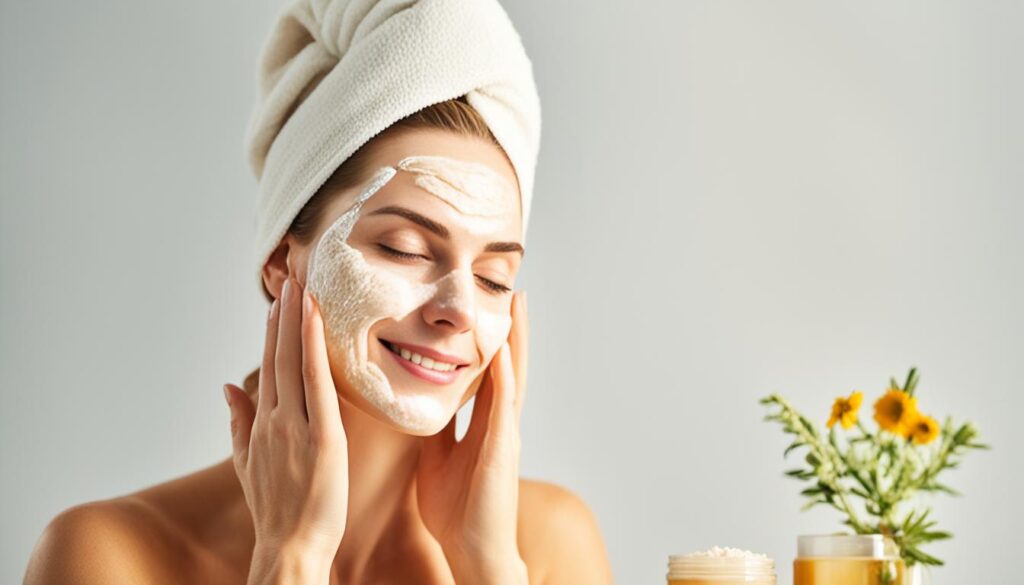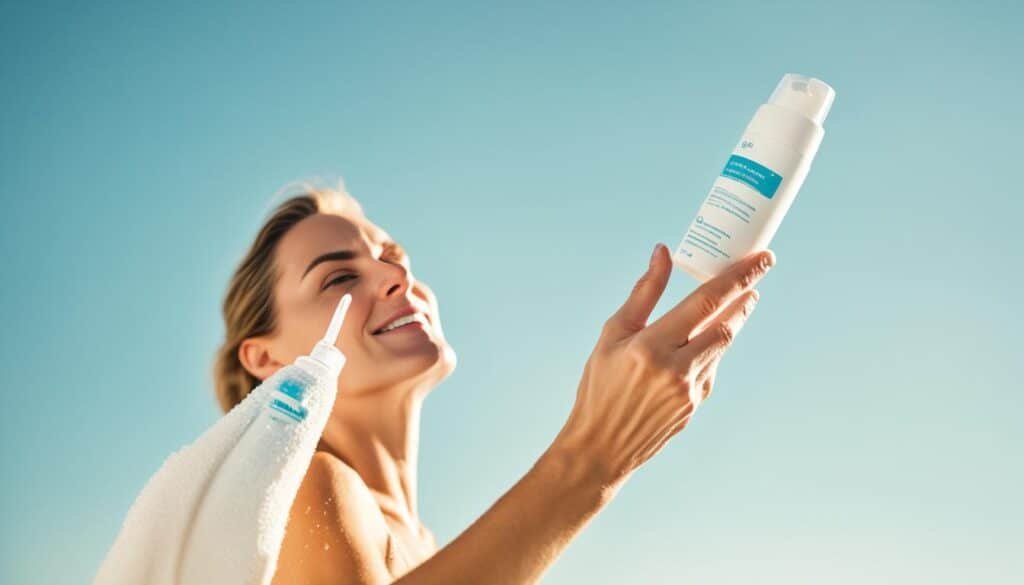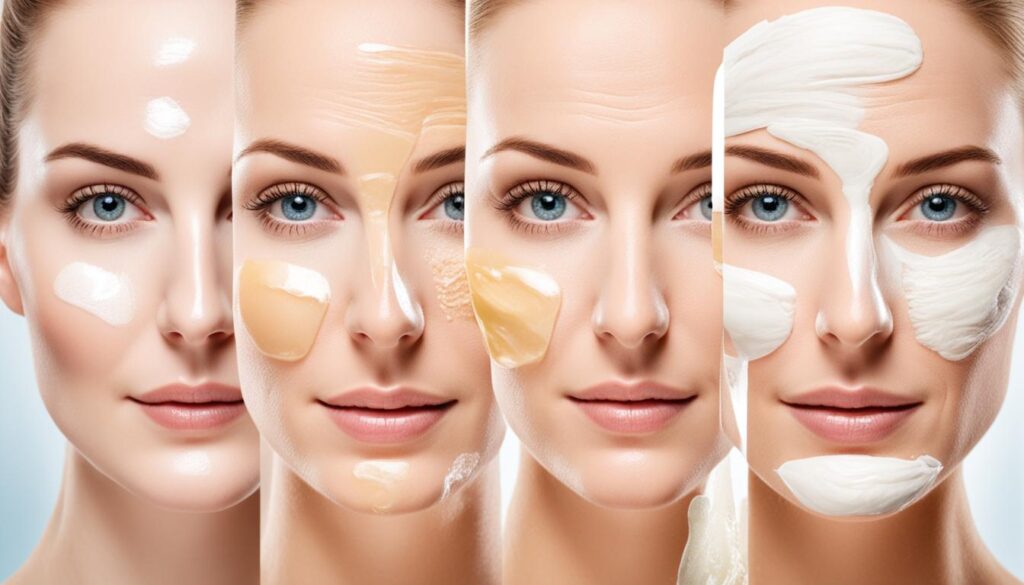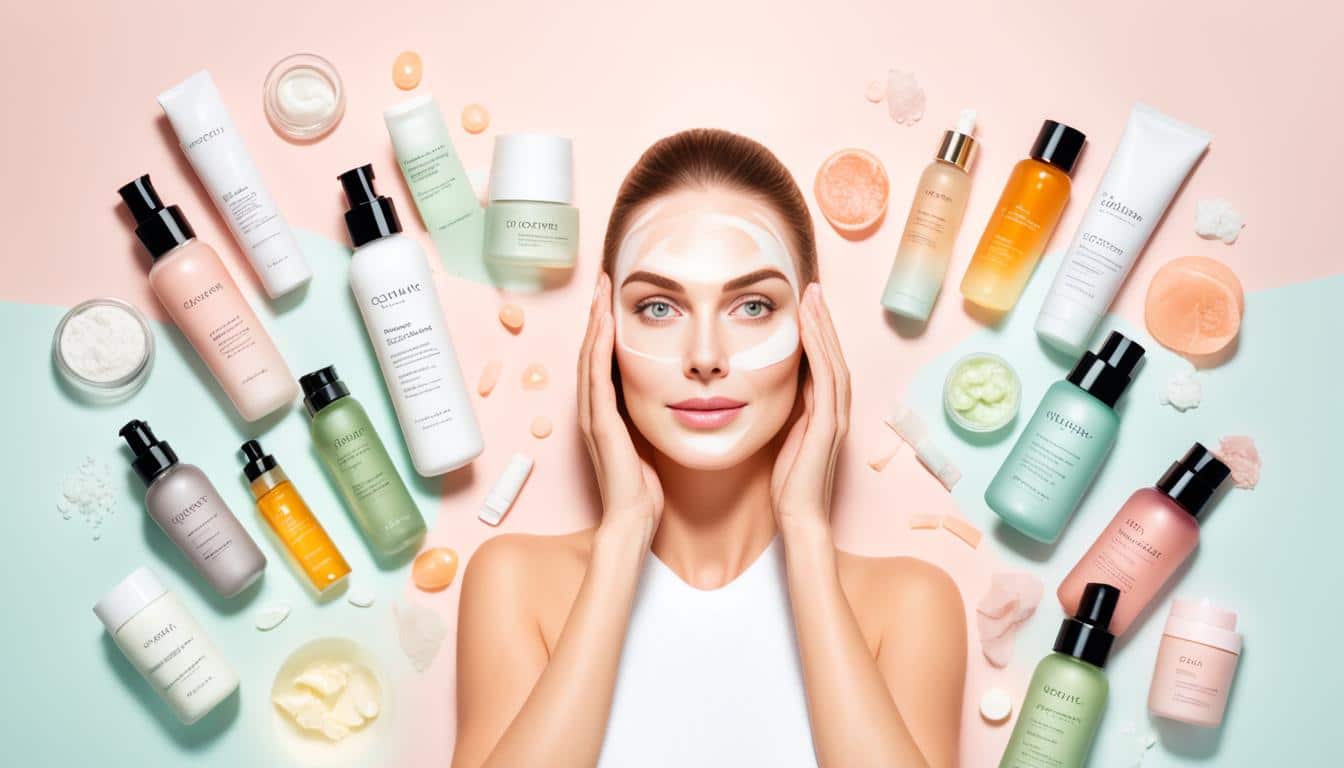Taking care of your skin is a daily commitment that can help you achieve radiant and healthy skin. A consistent skincare routine is key to maintaining a vibrant complexion and addressing specific skin concerns. In this article, we will explore the essential steps and products for an effective daily skincare routine.
Key Takeaways:
- Following a daily skincare routine is crucial for achieving radiant and healthy skin.
- A skincare routine consists of specific steps and products tailored to your skin type and concerns.
- Incorporating cleansers, moisturizers, serums, and sunscreen into your routine can help protect and nourish your skin.
- Understanding your skin type is essential in choosing the right products and addressing specific skin concerns.
- Consulting with a dermatologist can provide personalized advice and recommendations for your skincare routine.
Understanding Your Skin Type
Before diving into a skincare routine, it’s important to understand your skin type. Different skin types have different needs and require specific products and steps to address their concerns.
There are four primary skin types: combination skin, sensitive skin, dry skin, and oily skin. Each type has its unique characteristics and requires a targeted approach to maintain a healthy complexion.
Combination skin: This skin type typically has a mixture of both oily and dry areas. The T-zone, which includes the forehead, nose, and chin, tends to be oilier, while the cheeks are drier. It’s essential to find a balance in your skincare routine that addresses both areas.
Sensitive skin: Sensitive skin is prone to redness, irritation, and adverse reactions to certain ingredients. It requires gentle, fragrance-free products that soothe and protect the skin’s natural barrier.
Dry skin: Dry skin often feels tight, flaky, and lacking in moisture. It requires nourishing products that replenish hydration and lock in moisture to prevent further dryness.
Oily skin: Oily skin produces excess sebum, making it prone to clogged pores, acne breakouts, and a shiny appearance. It requires oil-controlling products that balance sebum production while maintaining hydration.
To determine your skin type, observe how your skin feels throughout the day and assess any specific concerns you may have. You can also consult with a dermatologist for a professional analysis.
Understanding your skin type is the first step towards crafting a skincare routine that addresses your individual needs and goals. By tailoring your products and steps to your specific skin type, you’ll be able to achieve healthier, more radiant skin.
Morning Skincare Routine
A well-rounded morning skincare routine is crucial to start your day with a fresh and protected complexion. By following a few key steps and using the right products, you can set the foundation for radiant and healthy skin. Let’s explore the essential components of a morning skincare routine.
Cleanser
The first step in any morning skincare routine is cleansing. Use a gentle cleanser that suits your skin type to remove impurities and excess oil accumulated overnight. Cleansing prepares your skin for the next steps and ensures a clean canvas for skincare products.
Sunscreen
Sunscreen is a non-negotiable step in your morning skincare routine. Protecting your skin from harmful UV rays is crucial for preventing premature aging and skin damage. Choose a broad-spectrum sunscreen with at least SPF 30 and apply it generously to your face, neck, and any exposed areas of your body.
Serum
A serum is a concentrated skincare product that delivers targeted benefits to your skin. After cleansing and before moisturizing, apply a serum that addresses your specific concerns, such as hydration, brightening, or anti-aging. Look for serums containing ingredients like vitamin C, hyaluronic acid, or peptides.

Moisturizer
Hydration is key for maintaining healthy skin. After applying your serum, follow up with a moisturizer that suits your skin type. Moisturizers help lock in moisture, improve skin elasticity, and create a protective barrier against external aggressors.
Eye Cream
The delicate skin around your eyes requires special care. Apply an eye cream to hydrate the under-eye area, reduce puffiness, and diminish the appearance of fine lines and dark circles. Gently pat the eye cream using your ring finger to avoid tugging on the delicate skin.
By incorporating these essential steps and products into your morning skincare routine, you can ensure your skin is clean, protected, and nourished throughout the day. Remember to choose products that suit your skin type and address your specific concerns for optimal results.
Evening Skincare Routine
An evening skincare routine is crucial for repairing and rejuvenating your skin while you sleep. It is the perfect time to replenish and nourish your skin after a long day. By following a consistent evening routine, you can wake up to a refreshed and radiant complexion.
Cleanser
The first step in your evening skincare routine is cleansing. Use a gentle cleanser to remove dirt, oil, and impurities accumulated throughout the day. Massage the cleanser onto damp skin, then rinse with lukewarm water. Pat your face dry with a clean towel.
Moisturizer
After cleansing, apply a moisturizer to hydrate and protect your skin. Look for a nourishing moisturizer that suits your skin type. Gently massage the moisturizer onto your face and neck in upward motions. Allow it to absorb fully before proceeding to the next step.
Serum
Next, apply a serum to target specific skin concerns. Serums are formulated with potent ingredients that penetrate deeply into the skin. Choose a serum that addresses your skincare needs, such as boosting collagen production, brightening dark spots, or reducing the appearance of fine lines and wrinkles. Apply a few drops of the serum to your fingertips and gently pat it into your skin.
Eye Cream
Don’t forget to give special attention to the delicate skin around your eyes. Apply an eye cream or gel to moisturize and reduce puffiness or dark circles. Use your ring finger to dab a small amount of eye cream around the orbital bone, avoiding direct contact with the eyes.
Night Cream
To seal in all the goodness from the previous steps, apply a night cream. Night creams are typically richer in texture and contain ingredients that support skin cell renewal overnight. Massage the night cream onto your face and neck, allowing it to absorb fully.
“An evening skincare routine is vital for giving your skin the opportunity to repair and rejuvenate during sleep.”
By following this evening skincare routine consistently, you can enhance the effectiveness of your nighttime skincare products and wake up to healthier, more radiant skin. Remember to choose products that are suitable for your skin type and address your specific skin concerns.
| Step | Product | Benefits |
|---|---|---|
| 1 | Cleanser | Removes dirt and impurities |
| 2 | Moisturizer | Hydrates and protects the skin |
| 3 | Serum | Targets specific skin concerns |
| 4 | Eye Cream | Moisturizes and soothes the delicate eye area |
| 5 | Night Cream | Supports skin cell renewal overnight |

Cleansing and Exfoliating
Cleansing and exfoliating are two essential steps in any skincare routine. They play a crucial role in removing impurities, dead skin cells, and revitalizing your complexion for a brighter and clearer appearance.
First and foremost, cleansing is the foundation of a healthy skincare routine. It involves using a gentle cleanser to remove dirt, oils, and makeup from the surface of your skin. Cleansing not only helps maintain a clean complexion but also allows other skincare products to penetrate more effectively.
Pro tip: When choosing a cleanser, opt for one that suits your skin type. For oily or acne-prone skin, consider a cleanser with salicylic acid to help remove excess oil and unclog pores. For dry or sensitive skin, go for a gentle and hydrating cleanser that won’t strip away natural oils.
Quote: “Cleansing is the first step towards achieving healthy skin. It removes impurities and prepares the canvas for the rest of your skincare routine.” – Dr. Emily Johnson, Dermatologist
Exfoliation, on the other hand, helps get rid of dead skin cells and reveals a fresh and glowing complexion underneath. It can be done through physical exfoliation (using a scrub or brush) or chemical exfoliation (using products with ingredients like AHAs or BHAs).
Regular exfoliation not only promotes cell turnover but also enhances the absorption of skincare products by clearing away any buildup on the skin’s surface. However, it’s crucial to exfoliate gently and avoid overdoing it, as harsh exfoliation can lead to irritation and dryness.
Pro tip: If you have sensitive or acne-prone skin, opt for milder exfoliation methods and avoid abrasive scrubs. Look for gentle chemical exfoliants with AHAs such as glycolic or lactic acid.
Recommended cleansing and exfoliating routine:
| Morning Routine | Evening Routine |
|---|---|
|
|
Remember, everyone’s skin is unique, so it’s essential to pay attention to how your skin responds to cleansing and exfoliating. If you experience any irritation or discomfort, adjust your routine accordingly and consult with a dermatologist if needed.

By incorporating proper cleansing and exfoliating techniques into your skincare routine, you can effectively remove impurities, eliminate dead skin cells, and achieve a more radiant and vibrant complexion.
Hydration and Moisturization
Proper hydration and moisturization are essential for maintaining healthy and plump skin. Dehydrated skin can lead to dryness, dullness, and an overall lack of moisture, making it crucial to incorporate effective moisturizers into your daily skincare routine.
One key ingredient to look for in a moisturizer is hyaluronic acid. Hyaluronic acid is a humectant that can hold up to 1000 times its weight in water, making it incredibly hydrating for the skin. It helps to attract and retain moisture, keeping your skin well-hydrated throughout the day.
Moisturizers enriched with humectants like hyaluronic acid work by locking in moisture and creating a protective barrier on the skin’s surface. This barrier helps to prevent transepidermal water loss (TEWL), ensuring that your skin stays hydrated and moisturized.
When choosing a moisturizer, opt for one that suits your skin type and addresses any specific concerns you may have, such as dryness or sensitivity. Look for formulations that are nourishing, lightweight, and easily absorbed into the skin.
For dehydrated skin, consider using a moisturizer with occlusive ingredients like shea butter or ceramides. These ingredients help to seal in moisture and prevent water loss, providing long-lasting hydration.
Applying moisturizer twice daily, in the morning and evening, is crucial for maintaining optimal hydration. After cleansing your face, apply a small amount of moisturizer and gently massage it into your skin using upward motions.
In addition to moisturizer, don’t forget to drink an adequate amount of water throughout the day to keep your skin hydrated from within.

Using a moisturizer that suits your skin type and addresses your specific needs is an essential step in your skincare routine. Whether you have dry, oily, or combination skin, incorporating a hydrating moisturizer can help restore and maintain your skin’s moisture balance, leaving it looking healthy and radiant.
Targeting Specific Skin Concerns
If you have specific skin concerns like acne-prone skin, fine lines, wrinkles, or dark spots, it’s important to incorporate targeted treatments and serums into your skincare routine. These specialized products are designed to address specific issues and provide the extra care and nourishment your skin needs.
Addressing Acne-Prone Skin

Acne-prone skin requires gentle yet effective ingredients to combat breakouts and reduce inflammation. Look for skincare products that contain salicylic acid, benzoyl peroxide, or tea tree oil. These ingredients help unclog pores, control sebum production, and minimize the appearance of acne.
Targeting Fine Lines and Wrinkles
Fine lines and wrinkles are common signs of aging that can be targeted with the use of retinol-based products. Retinol, a form of vitamin A, helps stimulate collagen production, improve skin elasticity, and reduce the appearance of fine lines and wrinkles. Incorporating a retinol serum or cream into your routine can help firm and smooth your skin.
Dealing with Sensitive Skin
If you have sensitive skin, it’s important to choose skincare products that are gentle, fragrance-free, and formulated for sensitive skin. Look for soothing ingredients like aloe vera, chamomile, or oat extract. These ingredients can help calm redness, irritation, and inflammation, providing relief for sensitive skin.
Diminishing Dark Spots and Uneven Skin Tone
Dark spots and uneven skin tone can be caused by sun damage or post-inflammatory hyperpigmentation. To address these concerns, look for skincare products that contain ingredients like vitamin C or niacinamide. These ingredients help brighten the skin, fade dark spots, and even out skin tone, giving you a more radiant and balanced complexion.
The Power of Serums
Incorporating a serum into your skincare routine can provide concentrated treatment for specific skin concerns. Serums are lightweight, fast-absorbing, and packed with active ingredients that target specific issues. Choose a serum that suits your skin type and concerns, whether it’s for hydration, brightening, or firming.
| Concern | Targeted Treatment |
|---|---|
| Acne-Prone Skin | Products with salicylic acid, benzoyl peroxide, or tea tree oil |
| Fine Lines and Wrinkles | Retinol-based serums or creams |
| Sensitive Skin | Fragrance-free, gentle products with soothing ingredients |
| Dark Spots and Uneven Skin Tone | Vitamin C or niacinamide-based treatments |
By targeting your specific skin concerns with the right products and ingredients, you can effectively address these issues and achieve healthier, more radiant skin.
Sun Protection
Protecting your skin from harmful UV rays is essential for maintaining its health and preventing premature aging. Sunscreen plays a vital role in shielding your skin from UVA/UVB rays and minimizing the risk of sun damage.

Using sunscreen with an adequate SPF (Sun Protection Factor) is crucial for effective sun protection. SPF measures the level of protection against UVB rays, the primary cause of sunburn. It is recommended to use a broad-spectrum sunscreen that provides protection against both UVA and UVB rays.
Applying sunscreen should be a part of your daily skincare routine, no matter the weather or season. Make sure to cover all exposed areas of your skin, including your face, neck, arms, and legs. Don’t forget areas like your ears, hands, and feet, as they are often neglected.
When applying sunscreen, be generous and ensure even coverage. Remember to reapply every two hours, especially if you’re sweating or swimming. Sunscreen can wear off over time and lose its effectiveness, so it’s essential to reapply regularly.
UV rays can penetrate through clouds and windows, so even if you’re indoors, it’s advisable to wear sunscreen to protect your skin. Additionally, consider using other protective measures like wearing wide-brimmed hats, sunglasses, and seeking shade during peak sun hours.
Regular use of sunscreen can significantly reduce the risk of sunburn, skin damage, and skin cancer. Incorporating sunscreen into your skincare routine is an investment in the long-term health and appearance of your skin.
“Protect your skin from the harmful effects of UV rays by using sunscreen with proper SPF and following proper application techniques.”
Ingredients to Look for
Understanding the key ingredients in skincare products can help you choose the right products for your skin type and address specific concerns effectively.
When it comes to skincare, active ingredients play a vital role in delivering visible results. From promoting collagen production to combating free radicals, let’s explore some of the powerhouse ingredients that you should look out for:
Collagen
Collagen is a protein that provides structure and strength to the skin. It helps improve skin elasticity and reduces the appearance of fine lines and wrinkles. Look for products that contain collagen to help restore youthful-looking skin.
Hyaluronic Acid
Hyaluronic acid is a humectant that can hold up to 1000 times its weight in water. It deeply hydrates the skin, making it plump and supple. Incorporating hyaluronic acid into your skincare routine can help combat dryness and improve overall skin texture.
Salicylic Acid
If you have acne-prone or oily skin, salicylic acid is an ingredient you should consider. It exfoliates the skin, unclogs pores, and helps reduce acne breakouts. Salicylic acid also has anti-inflammatory properties, making it an excellent choice for managing acne-prone skin.
Peptides
Peptides are short chains of amino acids that can stimulate collagen production and improve skin firmness. They help reduce the appearance of wrinkles and fine lines, promoting a more youthful complexion. Look for products containing peptides for anti-aging benefits.
Vitamin C
Vitamin C is a powerful antioxidant that protects the skin from free radicals and environmental damage. It brightens the complexion, evens out skin tone, and promotes collagen synthesis. Adding vitamin C to your routine can help achieve a radiant and glowing complexion.
Free Radicals

Free radicals are unstable molecules that can damage the skin and accelerate the aging process. They are caused by factors such as pollution, UV rays, and stress. To combat free radical damage, look for antioxidants like vitamin C and E in your skincare products.
| Active Ingredient | Benefits | Recommended Products |
|---|---|---|
| Collagen | Improves skin elasticity and reduces the appearance of fine lines and wrinkles | XYZ Collagen Cream |
| Hyaluronic Acid | Deeply hydrates the skin and improves overall skin texture | ABC Hyaluronic Acid Serum |
| Salicylic Acid | Exfoliates the skin, unclogs pores, and reduces acne breakouts | 123 Salicylic Acid Cleanser |
| Peptides | Stimulates collagen production and reduces the appearance of wrinkles | DEF Peptide Serum |
| Vitamin C | Protects the skin from free radicals and brightens the complexion | GHI Vitamin C Moisturizer |
By incorporating skincare products with these active ingredients into your routine, you can address specific concerns and achieve healthier, more radiant skin.
Establishing a Routine Based on Your Skin Type
Each skin type has its own unique needs and requires a tailored skincare routine to address specific concerns. Whether you have combination, oily, dry, or sensitive skin, here are some recommendations to help you establish an effective skincare routine:
Skincare Routine for Combination Skin
Combination skin can be tricky to manage as it tends to be oily in some areas (such as the T-zone) and dry in others. Here’s a skincare routine that can balance your skin:
- Cleanser: Use a gentle cleanser to remove impurities and excess oil without stripping the skin.
- Toner: Apply a toner to help balance the skin’s pH levels.
- Moisturizer: Choose a lightweight and oil-free moisturizer to hydrate the skin without clogging pores.
- Sunscreen: Protect your skin from harmful UV rays by applying a broad-spectrum sunscreen with at least SPF 30.
- Treatment: Consider using a targeted treatment like a serum or spot treatment for specific concerns like acne or hyperpigmentation.
Skincare Routine for Oily Skin
Oily skin tends to produce excess sebum, leading to a shiny complexion and potential breakouts. Follow this skincare routine to manage oiliness:
- Cleanser: Use a gentle, oil-free cleanser to remove excess oil and impurities.
- Toner: Apply an alcohol-free toner to help control oil production.
- Lightweight Moisturizer: Opt for a non-comedogenic, oil-free moisturizer to hydrate the skin without adding extra oil.
- Sunscreen: Protect your skin from the sun with a lightweight, oil-free sunscreen.
- Exfoliation: Incorporate exfoliation into your routine 1-2 times a week to unclog pores and remove dead skin cells.
Skincare Routine for Dry Skin
Dry skin lacks moisture and can feel tight and rough. Here’s a skincare routine to nourish and hydrate dry skin:
- Creamy Cleanser: Use a creamy or hydrating cleanser to cleanse the skin without stripping away natural oils.
- Toner: Apply a gentle toner to help hydrate and prep the skin for better absorption of moisturizer.
- Rich Moisturizer: Choose a moisturizer with emollients and occlusives to lock in moisture and improve skin elasticity.
- Sunscreen: Protect your skin from the sun’s damaging rays by using a moisturizer or a sunscreen with SPF 30 or higher.
- Hydrating Masks: Treat your skin to weekly hydrating masks to give it an extra boost of moisture.
Skincare Routine for Sensitive Skin
Sensitive skin is prone to irritation, redness, and reactions. Follow this gentle skincare routine to avoid triggering sensitivity:
- Mild Cleanser: Use a fragrance-free, gentle cleanser that is specifically formulated for sensitive skin.
- Toner: Choose an alcohol-free toner to soothe and calm sensitive skin.
- Lightweight Moisturizer: Opt for a hypoallergenic and fragrance-free moisturizer to hydrate your skin without causing irritation.
- Sunscreen: Protect your sensitive skin from the sun with a mineral-based sunscreen that contains zinc oxide or titanium dioxide.
- Treatment: Avoid harsh treatments and instead focus on using calming serums and masks that are designed for sensitive skin.
Recommended Skincare Routine Regimen for Different Skin Types:
| Step | Combination Skin | Oily Skin | Dry Skin | Sensitive Skin |
|---|---|---|---|---|
| Cleanser | Gentle cleanser | Oil-free cleanser | Creamy cleanser | Mild cleanser |
| Toner | Balancing toner | Oil-controlling toner | Hydrating toner | Gentle, alcohol-free toner |
| Moisturizer | Oil-free moisturizer | Lightweight moisturizer | Rich moisturizer | Hydrating, fragrance-free moisturizer |
| Sunscreen | Broad-spectrum SPF 30+ | Oil-free, lightweight sunscreen | Moisturizer with SPF 30+ | Mineral-based sunscreen |
| Treatment | Targeted treatment for specific concerns | Exfoliating treatments | Hydrating masks | Gentle serums and masks for sensitive skin |
Remember, finding the right skincare routine for your skin type may require some trial and error. Be patient and listen to your skin’s needs. If you have severe skin concerns or allergies, it’s always best to consult a dermatologist for personalized advice and recommendations.

Expert Tips and Tricks for Healthy Skin
In addition to following a regular skincare routine, incorporating expert tips and tricks can enhance the effectiveness of your skincare regimen. Dermatologists offer valuable advice on the order of application, helpful regimens, and other skincare tips and tricks that can help you achieve healthy, radiant skin.
Order of Application
Properly applying skincare products in the correct order is essential for maximizing their benefits. Dermatologists recommend following this order:
- Cleanser: Start by cleansing your face to remove impurities and prepare your skin for the following steps.
- Toner: Apply toner to balance your skin’s pH levels and further remove any remaining residue.
- Treatment Products: This includes serums, spot treatments, and other targeted products. Apply them based on their consistency, from thinnest to thickest.
- Moisturizer: Lock in moisture and provide hydration to your skin with a moisturizer suitable for your skin type.
- Sunscreen: Protect your skin from harmful UV rays by applying sunscreen as the final step in your morning routine.
Helpful Regimens
Creating a customized skincare regimen can address specific skin concerns and provide optimal results. Dermatologists recommend the following regimens for common skincare concerns:
| Skincare Concern | Recommended Regimen |
|---|---|
| Acne-Prone Skin | Use a gentle cleanser, followed by a salicylic acid treatment and an oil-free moisturizer. Incorporate a retinol serum for acne-scarring or post-inflammatory hyperpigmentation. |
| Fine Lines and Wrinkles | Include a hydrating cleanser, a serum containing peptides or hyaluronic acid, and a moisturizer with anti-aging ingredients like retinol or vitamin C. |
| Dark Spots and Uneven Skin Tone | Opt for a gentle cleanser, a serum containing brightening ingredients like vitamin C or niacinamide, and a moisturizer with SPF to prevent further discoloration. |
Professional Dermatologist Advice
“One of the most important things to remember is consistency. Stick to a routine that works for you and give it time to show results. Don’t forget to use sunscreen daily, regardless of the weather, to protect your skin from sun damage and premature aging.” – Dr. Emily Johnson, Board-Certified Dermatologist
Consulting with a dermatologist is highly recommended for personalized skincare advice and specific recommendations tailored to your skin type and concerns. Their expertise can provide valuable insights and guidance to help you achieve and maintain healthy, glowing skin.

Conclusion
In conclusion, maintaining a daily skincare routine that is tailored to your specific skin type and concerns is crucial for achieving and maintaining radiant and healthy skin. By following the recommended steps and incorporating the right products mentioned in this article, you can take the first steps towards a glowing complexion.
Also Read : Summer Skincare Essentials for Glowing Skin
Remember that consistency is key when it comes to skincare. Stick to your routine and give it time to work its magic. Results may not be immediate, but with patience and dedication, you will begin to see improvements in your skin’s texture, tone, and overall appearance.
While this article provides valuable insights and guidance, it’s important to note that everyone’s skin is unique. Consulting with a dermatologist or skincare professional can provide personalized advice and recommendations based on your specific needs and concerns.
FAQ
Q: What are the essential steps in a daily skincare routine?
A: A basic skincare routine typically consists of cleansing, toning, applying serums, moisturizing, and protecting the skin with sunscreen during the day.
Q: How can I choose the best skincare products for my skin?
A: The best skincare products depend on your skin type and concerns. Consulting with a dermatologist can help you determine the most suitable products for your skin.
Q: Should I exfoliate my skin daily?
A: Exfoliation should be done 2-3 times a week, depending on your skin type. Daily exfoliation can irritate the skin and cause damage.
Q: Is it necessary to use a toner in my skincare routine?
A: Toners can help balance the skin’s pH levels and prepare it to better absorb serums and moisturizers. However, they are not essential for everyone.
Q: How can retinol benefit my skin?
A: Retinol is known for its anti-aging benefits, including reducing the appearance of wrinkles, fine lines, and improving skin texture and tone.
Q: Can certain skincare products irritate the skin?
A: Yes, some skincare products containing harsh ingredients or excessive exfoliants can irritate the skin, especially if you have sensitive skin. It’s important to choose products that are gentle and suitable for your skin type.
Q: What is the importance of using a vitamin C serum in the morning?
A: Vitamin C serum can help protect the skin from environmental damage, brighten the complexion, and boost collagen production. It is recommended to use it in the morning for maximum benefits.
Q: What are the essential steps of a daily skincare routine for radiant skin?
A: A basic daily skincare routine should include cleansing, toning, applying serum, moisturizing, and applying sunscreen in the morning. At night, you should cleanse, tone, apply a treatment product like retinol or acne medication, and moisturize.
Q: How do I choose the best skincare products for my skin?
A: The best skincare products for you depend on your skin type, concerns, and preferences. Consulting with a dermatologist can help you determine which products will be most effective for your skin.
Q: Is it important to use toner in a skincare routine?
A: Toner helps to balance the skin’s pH levels, remove any remaining impurities, and prepare the skin to absorb the subsequent skincare products more effectively, making it a valuable step in a skincare routine.
